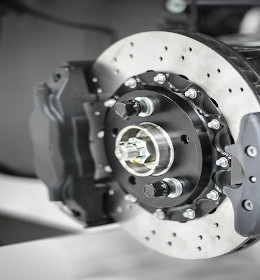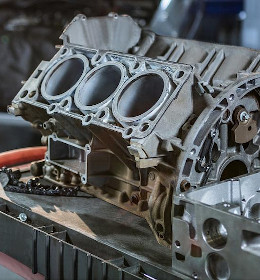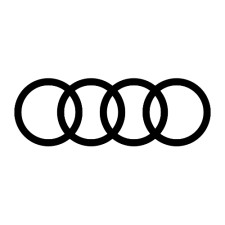Que signifie votre code Code Défaut DACIA ?
Grace au système OBD, les
Dacia
fabriqués après 1996 sont normalement équipés d'une prise diagnostique OBD.
Si l'ordinateur de la voiture rencontre un problème,un code d'erreur ou un code de diagnostic (DTC)
sera stocké dans la mémoire de l'ECU de la voiture.
Avec un lecteur OBD branché sur le port OBD (On-Board Diagnostics) de la voiture, vous pouvez lire la liste des codes stockés, et donc découvrir quel est le problème.
Les codes suivent une formule permettant de savoir généralement quel est le problème avant même de regarder le tableau ci-dessous.
Nous vous présentons ci-dessus une liste très complète des différents codes défauts possibles.
Si le code défaut de votre auto s'affiche au tableau de bord, vous n'aurez peut-être même pas besoin d'un lecteur OBD . il sera dans la liste .
Réparer le code défaut de votre auto, c'est potentiellement simple à faire avec vos revues et méthodes techniques.

Réparer le code défaut de votre auto, c’est potentiellement simple à faire avec nos revues et méthodes techniques
| Code | Libellé |
|---|---|
| P247E | Exhaust gas temperature sensor 3 behind the catalytic converter, signal out of range (bank 2) |
| P247F | Exhaust gas temperature sensor 4 behind the catalytic converter, signal out of range (bank 2) |
| P2480 | Exhaust gas temperature sensor 5 behind the catalytic converter, circuit/open (bank 1) |
| P2481 | Exhaust gas temperature sensor 5 behind the catalytic converter, circuit low (bank 1) |
| P2482 | Exhaust gas temperature sensor 5 behind the catalytic converter, circuit high (bank 1) |
| P2483 | Exhaust gas temperature sensor 5 behind the catalytic converter, circuit range/performance (bank 1) |
| P2484 | Exhaust gas temperature sensor 5 behind the catalytic converter, circuit intermittent/erratic (bank 1) |
| P2485 | Exhaust gas temperature sensor 5 behind the catalytic converter, circuit/open (bank 2) |
| P2486 | Exhaust gas temperature sensor 5 behind the catalytic converter, circuit low (bank 2) |
| P2487 | Exhaust gas temperature sensor 5 behind the catalytic converter, circuit high (bank 2) |
| P2488 | Exhaust gas temperature sensor 5 behind the catalytic converter, circuit range/performance (bank 2) |
| P2489 | Exhaust gas temperature sensor 5 behind the catalytic converter, circuit intermittent/erratic (bank 2) |
| P248A | Reductant heater 1 circuit low |
| P248B | Reductant heater 1 circuit high |
| P248C | Reductant heater 2 circuit low |
| P248D | Reductant heater 2 circuit high |
| P248E | EGR cooler bypass control circuit/open (bank 2) |
| P248F | EGR cooler bypass control circuit range/performance (bank 2) |
| P2490 | EGR cooler bypass control circuit low (bank 2) |
| P2491 | EGR cooler bypass control circuit high (bank 2) |
| P2492 | EGR cooler bypass position sensor circuit/open (bank 1) |
| P2493 | EGR cooler bypass position sensor circuit range/performance (bank 1) |
| P2494 | EGR cooler bypass position sensor circuit low (bank 1) |
| P2495 | EGR cooler bypass position sensor circuit high (bank 1) |
| P2496 | EGR cooler bypass position sensor circuit intermittent/erratic (bank 1) |
| P2497 | EGR cooler bypass position sensor circuit/open (bank 2) |
| P2498 | EGR cooler bypass position sensor circuit range/performance (bank 2) |
| P2499 | EGR cooler bypass position sensor circuit low (bank 2) |
| P249A | EGR cooler bypass position sensor circuit high (bank 2) |
| P249B | EGR cooler bypass position sensor circuit intermittent/erratic (bank 2) |
| P249C | Reductant injection system, entering closed loop takes too long |
| P249D | Reductant injection system limit reached - insufficient flow |
| P249E | Reductant injection system limit reached, excessive flow |
| P249F | Diesel/petrol particulate filter regeneration control, entering closed loop takes too long |
| P24A0 | Diesel/petrol particulate filter regeneration control limit reached, temperature too low |
| P24A1 | Diesel/petrol particulate filter regeneration control limit reached, temperature too high |
| P24A2 | Diesel/petrol particulate filter regeneration incomplete (bank 1) |
| P24A3 | Diesel/petrol particulate filter restriction caused by soot accumulation (bank 2) |
| P24A4 | Diesel/petrol particulate filter restriction caused by soot accumulation (bank 1) |
| P24A5 | EGR cooler bypass control stuck (bank 1) |
| P24A6 | EGR cooler bypass control stuck (bank 2) |
| P24A7 | EGR coolant pump control circuit/open |
| P24A8 | EGR coolant pump control range/performance |
| P24A9 | EGR coolant pump control circuit low |
| P24AA | EGR coolant pump control circuit high |
| P24AB | EGR coolant pump control stuck |
| P24AC | EGR coolant pump control circuit low |
| P24AD | EGR coolant pump control circuit high |
| P24B8 | Evaporative emission system leak detection pump pressure sensor circuit/open |
| P24B9 | Evaporative emission system leak detection pump pressure sensor circuit range/performance |
| P24BA | Evaporative emission system leak detection pump pressure sensor circuit low |
| P24BB | Evaporative emission system leak detection pump pressure sensor circuit high |
| P24BC | Evaporative emission system leak detection pump pressure sensor circuit intermittent |
| P24BD | Evaporative emission system leak detection pump switching valve control circuit/open |
| P24BE | Evaporative emission system leak detection pump switching valve control circuit low |
| P24BF | Evaporative emission system leak detection pump switching valve control circuit high |
| P24C0 | Evaporative emission system leak detection pump switching valve stuck on |
| P24C1 | Evaporative emission system leak detection pump switching valve performance/stuck off |
| P24D2 | Reductant heater 1 sense circuit/open |
| P24D3 | Reductant heater 2 sense circuit/open |
| P24D5 | Evaporative emission system pressure sensor 2 circuit/open |
| P24D6 | Evaporative emission system pressure sensor 2 circuit range/performance |
| P24D7 | Evaporative emission system pressure sensor 2 circuit low |
| P24D8 | Evaporative emission system pressure sensor 2 circuit high |
| P24D9 | Evaporative emission system pressure sensor 2 circuit intermittent |
| P24DB | Reductant purge control valve 2 circuit /open |
| P24DC | Reductant purge control valve 2 performance |
| P24DD | Reductant purge control valve 2 circuit low |
| P24DE | Reductant purge control valve 2 circuit high |
| P24DF | Reductant purge control valve 2 stuck open |
| P24E0 | Reductant purge control valve 2 stuck closed |
| P24F3 | Reductant tank temperature correlation with fuel temperature |
| P24F6 | Exhaust aftertreatment fuel, air purge valve stuck open |
| P24F7 | Exhaust aftertreatment fuel, air purge valve stuck closed |
| P24F8 | Exhaust aftertreatment fuel, air purge valve control circuit/open |
| P24F9 | Exhaust aftertreatment fuel, air purge valve control circuit range/performance |
| P24FA | Exhaust aftertreatment fuel, air purge valve control circuit low |
| P24FB | Exhaust aftertreatment fuel, air purge valve control circuit high |
| P24FF | Reductant temperature too high |
| P2500 | Alternator warning light/L-terminal circuit low |
| P2501 | Alternator warning light/L-terminal circuit high |
| P2502 | Charging system voltage |
| P2503 | Charging system circuit low |
| P2504 | Charging system circuit high |
| P2505 | Engine control unit/powertrain control unit power input signal |
| P2506 | Engine control unit/powertrain control unit power input signal range/performance |
| P2507 | Engine control unit/powertrain control unit power input, low signal |
| P2508 | Engine control unit/powertrain control unit power input, high signal |
| P2509 | Engine control unit/powertrain control unit power input signal intermittent |
| P250A | Engine oil level sensor circuit/open |
| P250B | Engine oil level sensor circuit range/performance |
| P250D | Engine oil level sensor circuit high |
| P250E | Engine oil level sensor circuit intermittent/erratic |
| P250F | Engine oil level too low |
| P2510 | Main relay sense circuit range/performance |
| P2511 | Main relay sense circuit intermittent |
| P2515 | Refrigerant pressure sensor 2 circuit/open |
| P2516 | Refrigerant pressure sensor 2 circuit range/performance |
| P2517 | Refrigerant pressure sensor 2 circuit low |
| P2518 | Refrigerant pressure sensor 2 circuit high |
DEFINISSEZ VOTRE MARQUE POUR ACCEDER A VOS CODES DEFAUTS
-
Revue technique RTA

Revue Technique Automobile
La revue technique de référence depuis 1946. La RTA est une revue papier pour tous publics, qui vous permet d'effectuer les petites et les grosses réparations
 Voir le descriptif
Voir le descriptif
-
Entretien courant MTA

Méthode Technique Automobile
La MTA est issue de nos outils destinés aux pros de l'auto. Ces méthodes en ligne permettent d'effectuer les opérations de maintenances de votre auto (filtres, courroies, etc.)
 Voir le descriptif
Voir le descriptif
-
Toutes réparations MTAx

Méthode Technique Automobile Expert
La MTA expert est un outil en ligne destiné aux experts en mécanique et en carrosserie, pour effectuer tous types de réparations sur une voiture.
 Voir le descriptif
Voir le descriptif















